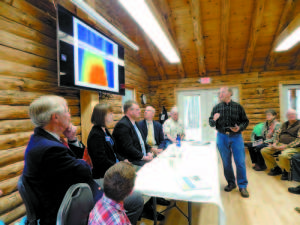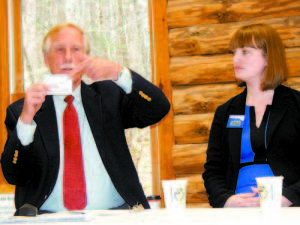Sen. Angus King: Climate change stakes couldn’t get hotter

THIN ICE — Lakes Environmental Association Executive Director Peter Lowell, standing, introduced the speakers at a “Fishing on Thin Ice†forum on climate change held Monday at the Maine Lake Science Center. From left are U.S. Senator Angus King, Laura Dorle, Environment Maine Campaigns Director, Zach Wozich, Vice President of the Sebago Lake Anglers Association, Dr. Bruce Taylor, Sweden Selectman and a member of Physicians for Social Responsibility and David Miller, President of the Sebago Chapter of Trout Unlimited.
(Geraghty Photo)

IT’S IN THE CARDS — U.S. Sen. Angus King holds up a card he said he passes out to people whenever he can to urge action on climate change. (Geraghty Photo)
By Gail Geraghty
Staff Writer
One of the great problems of the next decade will be human migration out of the Middle East as sustained 120-degree temperatures renders much of the region inhabitable, U.S. Senator Angus King said Monday at a “Fishing on Thin Ice†forum in Bridgton.
King, a member of the Senate Armed Services and Intelligence Committees, went to Germany and other European countries last week, where he met with the national security advisor to German Chancellor Angela Merkel. The Syrian refugee problem that is tearing the politics of Europe apart, King said he was told, “is a precursor to a larger migration problem that’s coming,†that is going to dwarf the Syrian refugee crisis — and that can be tied directly to human-created climate change.
“The prediction is that temperatures in the Gulf Region are going to be around 120 degrees. Bangladesh could go under water. We are going to see a migration of that band of population around the center of the planet, primarily north to Europe, and North America, where the money is. And yet there’s no discussion of this,†King told a crowd of around 75 people gathered at the forum, held by Lakes Environmental Association at the Maine Lake Science Center. “Climate change is a very serious national security issue. Wars historically start over things like water, and land and air.â€
King, who was joined by panelists representing Environment Maine, Trout Unlimited and the Sebago Lake Anglers Association, said he is “genuinely puzzled†by how much of a partisan issue the subject of climate change has become. “When I came of age, the principle leadership on the environment were Republicans.†His best guess is that Al Gore’s Climate Reality Project created a lasting backlash that he and others now serving on the Senate Climate Action Task Force are trying to mend with such policy initiatives as the Administration’s Clean Power Plan
King said the policies, science and economics related to climate change all need to be addressed in their own way by national leaders, “But it also has to be you — that’s how we’re going to work ourselves through this. You all know — you can just walk around in Maine and see the changes in the last 20 or 30 years.†Many of Maine’s lakes are reporting the earliest ice out dates ever recorded, and rising ocean temperatures are driving lobster populations northward away from Maine waters.
What is most alarming, he said, is that the problems associated with a hotter climate “are happening a lot faster than people thought; in years, instead of decades.â€
Yet to many it still seems as if the problem is happening in slow motion, said King, and “We don’t like to disrupt our lives unless the problem is right in front of us. Winston Churchill said that Americans will always end up doing the right thing, only after trying everything else.â€
King said the work being done at places like the Maine Lake Science Center is so important because “We need the data — the science — we need to know what’s happening, why it’s happening and hopefully what we can do about it.†He held up a little card he said he carries around with him and gives to his colleagues at the Senate.
“To me, this is everything you need to know about climate change. On one side is the history of a million years of CO2 in the atmosphere. It always varied between 180 and 300 parts per million over the last million years, until 1860, which is when we started burning fossil fuels in large quantities. As carbon dioxide goes up, the temperature goes up. This is just data — and this is what convinced me†that human activity is making the planet hotter.
According to the National Oceanic and Atmospheric Administration, 2015 eclipsed 2014 as the warmest year on record. Just this past February set a new record for the highest monthly departure from average temperatures. In Maine, average temperatures have increased by three degrees over the past 100 years, which has changed the length and character of the seasons, causing the cancellation of several ice fishing derbies across the state.
The third action area is economics, said King, and in that regard, “One of the most important developments is the continuing lowering of the cost of solar.†The cost 25 years ago for solar panels was around $70 a watt, and now is about $1.80 a watt.
“It’s now more expensive to install a solar panel than to buy one,†he said. And even that hurdle is going to be solved soon, he said, noting that trade shows are now touting solar panels that are essentially roofing shingles.
“The economics of other options are going to make the most difference in the long run.â€

